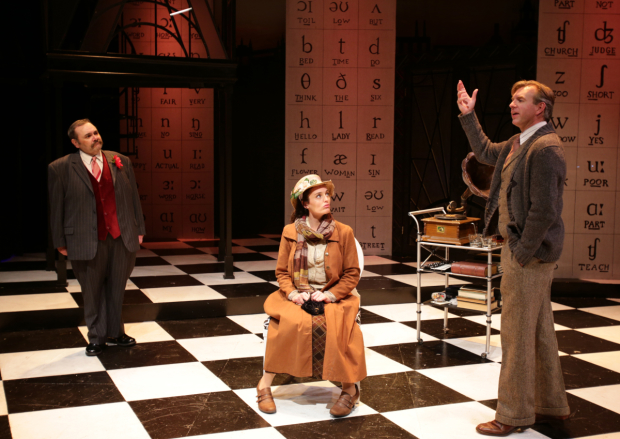My Fair Lady

(© Mark S. Howard)
My Fair Lady, that touchstone of American musicals, with a memorable score by Alan Jay Lerner and Frederick Loewe, is an icon of national theater, likely found onstage, between high school and regional productions, every night of the year. Based on George Bernard Shaw's 1914 play Pygmalion, My Fair Lady is a non-romantic take on the fortuitous meeting of the guttersnipe Eliza Doolittle and the pompous professor of language Henry Higgins. Since its 1957 premiere, the musical has not lost its charm or meaning.
For the original show, and the 1964 film based upon it, the story was expanded by a huge cast of characters, a full orchestra, and large, choreographed numbers to portray the crowds at the Ascot racetrack and the gathering at the Embassy Ball. Not so for director Scott Edmiston at the Lyric Stage Company, where My Fair Lady has been thoughtfully refashioned as a chamber musical for a cast of eight principal actor-singer-dancers, plus an ensemble of eight, accompanied by only a trio of fine musicians: Catherine Stornetta (music director and keyboard), Emily Dahl (violin), and Javier Caballero (cello). Edmiston puts the spotlight on the journey of the characters as they reverberate in their reactions to each other, allowing the audience a close-up of their roiling emotions.
The dazzling presence in the excellent cast assembled by Edmiston is Jennifer Ellis, the beautiful soprano who has played many leading roles in Boston theaters over the past few years. As the flower girl Eliza, plopped down on a box at Covent Garden, she is gauche, outspoken, and sassy-mouthed, but also longing for the comforts of a "room somewhere, far away from the cold night air." When she sees a strange man, Professor Higgins (Christopher Chew), watching her, she is instantly stung to self-defense. Even though she is a member of the lower class, Eliza has her pride, dignity, and a Cockney accent (kudos to dialect coach Amelia Broome).
Her innate qualities are polished to a high gloss as Higgins' pupil, when she masters "The Rain in Spain," and takes on the veneer of a genteel society lady, after having etiquette drummed into her by the insufferable Higgins, with the help of the genial Colonel Pickering (a sympathetic Remo Airaldi) and the stern but kindly Mrs. Pearce (Cheryl McMahon). It's to Ellis' credit that the essential personality of Eliza is present from beginning to end, even as she is groomed into a "consort fit for a king," as Higgins promises. Chew fares best at the end when his attraction to Eliza triumphs over his self-professed posture as a contented bachelor, although Shaw might be turning in his grave at the cave-in.
The other standout performance belongs to J.R. Turner as Alfred P. Doolittle, Eliza's rascally father who tries to make a fiver off the Professor, in exchange for his daughter. Turner is a music hall throwback, singing, dancing, and twitching his shoulders in glee as he leads the ensemble in the jig-stepping choreography devised by David Connolly for "With a Little Bit of Luck" and "Get Me to the Church on Time." As the hapless Freddy, Jared Troillo stops the show with his vocal chops for "On the Street Where You Live."
Both Edmiston and Connelly, veterans of previous Lyric Stage productions, make judicious use of the Lyric's small playing space, expanded by designer Janie E. Howland, into a two-story, abstract setting, enhanced by a large backdrop patterned in the phonetic alphabet. A pair of doors opens on occasion for a glimpse of the musicians, seated backstage.
By downsizing the spectacle elements of the original musical and playing to the acting strengths of Ellis and the cast surrounding her, Edmiston give this production an up-front and personal glimpse into the hearts of the leading characters. Rather than an elocution lesson, Edmiston delivers a more universal moral on the ways two people can connect as friends and companions, but surely not as lovers, despite the hint of a conventional happy ending.










